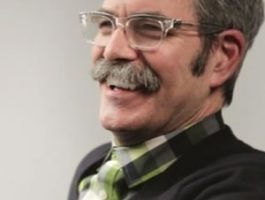
What to do About Midlife Struggles
What is a midlife crisis, and why does it occur? On the broadcast today, Dennis Rainey talks with Christian counselor Dr. Paul David Tripp, author of Lost in the Middle, to find out what happens when we realize that those things we had hoped for--being a size 4, becoming vice-president of the company--are never going to happen. Hear how you can find hope regardless of the circumstances of your life.
Show Notes
About the Host
About the Guest
-
What is a midlife crisis, and why does it occur? On the broadcast today, Dennis Rainey talks with Christian counselor Dr. Paul David Tripp, author of Lost in the Middle, to find out what happens when we realize that those things we had hoped for--being a size 4, becoming vice-president of the company--are never going to happen. Hear how you can find hope regardless of the circumstances of your life.
-
Dave and Ann Wilson
Dave and Ann Wilson are hosts of FamilyLife Today®, FamilyLife’s nationally-syndicated radio program. Dave and Ann have been married for more than 38 years and have spent the last 33 teaching and mentoring couples and parents across the country. They have been featured speakers at FamilyLife’s Weekend to Remember® marriage getaway since 1993 and have also hosted their own marriage conferences across the country. Cofounders of Kensington Church—a national, multicampus church that hosts more than 14,000 visitors every weekend—the Wilsons are the creative force behind DVD teaching series Rock Your Marriage and The Survival Guide To Parenting, as well as authors of the recently released book Vertical Marriage (Zondervan, 2019). Dave is a graduate of the International School of Theology, where he received a Master of Divinity degree. A Ball State University Hall of Fame quarterback, Dave served the Detroit Lions as chaplain for 33 years. Ann attended the University of Kentucky. She has been active alongside Dave in ministry as a speaker, writer, small-group leader, and mentor to countless wives of professional athletes. The Wilsons live in the Detroit area. They have three grown sons, CJ, Austin, and Cody, three daughters-in-law, and a growing number of grandchildren.
-

Paul David Tripp
Paul David Tripp is a pastor, author and conference speaker. He is the president of Paul Tripp Ministries and works to connect the transforming power of Jesus Christ to everyday life. This vision has led Paul to write 17 books on Christian living, produce 14 teaching series and travel aroun...more
Dr. Paul David Tripp talks about how you can find hope regardless of the circumstances of your life.
Bob: Do you ever feel like you just can't keep up with everything that is going on in life? It's gotten out of control? Here's Paul David Tripp.
Paul: My life has never been under my control, but it's not out of control. It's under the control of a God who is the ultimate source of love and wisdom and faithfulness and patience and grace. God will take you where you do not want to go in order to produce in you what you could not achieve on your own.
Bob: This is FamilyLife Today for Friday, October 13th. Our host is the president of FamilyLife, Dennis Rainey, and I'm Bob Lepine. So if life has seemed out of control for you, have you ever asked the question – what is God up to?
And welcome to FamilyLife Today, thanks for joining us. Do you think what we've been talking about this week, as we've talked about midlife and the challenges that are there – do you think this is real for most people or do you think it's just one of those things that some folks struggle through?
Dennis: You know, Bob, I think our cultural has done a good job of creating a category called "midlife crisis." It's almost like adolescence. Even though I didn't experience it, and I remember when I turned 40, I kept thinking, "When am I going to experience the urge to buy a gold chain?"
Bob: Mm-hm, motorcycle, something like that.
Dennis: Yeah, a red convertible. You know, when am I going to break out and go do all that? And it never happened.
Bob: Right.
Dennis: I'm not sure why, but I'm going to tell you, the e-mails from our listeners, they sure spell it out, and it's interesting – listen to this theme. Here is a listener who said, "I am in the middle of a midlife crisis with my husband. I don't want to split but can't fix what he's feeling, which is a lost hope.
Here is another one that says, "My husband was soon going through a midlife crisis, ended up divorcing me, leaving our family completely without much support. It's now been three and a half years since our divorce, but God's been standing with me, and I'm still hoping for my marriage to be restored. In the meantime, I don't hear a lot about midlife crisis and the effects it can have on a family."
We really do have a huge number of people who are lost in the middle. They are wandering through life and sometime between their 35th birthday and their 55th, they're going to go through an extended period of time that's going to cause them to question their lives, question their mission, their purpose, why they're here, what they have accomplished. They're going to look back with some regrets and wonder what the hope is for the future.
Bob: We've been exploring this theme this week with our guest, Paul Tripp, who has written a book called "Lost in the Middle." Paul, welcome back to FamilyLife Today.
Paul: Thanks, it's good to be with you.
Bob: We've talked about shattered dreams or about regrets or disappointments. When somebody's experiencing those things, will they actually trade in their marriage or their family to try to find something new?
Paul: The issue with disappointment or regret is not that I experience disappointment or regret. You can't possibly live in a fallen world and not experience disappointment or regret. It's what I do with that when I experience it. And maybe it would be worth just going through some of the danger signs for people – how to recognize that more destructive dissatisfaction, and I think these can be helpful to give people hooks to sort of hang their experience on.
One is just a cynicism for life – "I've just become one of those dark-side, negative people and negative about life because I don't like my life."
Dennis: And at that point, people have probably disappointed you.
Paul: Absolutely.
Dennis: And so you lose your hope in people being the delivery system of making me happy. Instead, they're making me sad or maybe even angry.
Paul: Yeah, that's right. The second would be the withholding of worship and service. I'm not so excited about singing those hymns and don't look forward to Sunday. There's a world there that seems distant from the world that I'm living in.
Third, would be growing anger. That can range from low-grade irritability to blow-up kinds of things. Craving for power and control – I'm mad at how my life has gone, so I'm going to change it, I'm going to take charge of my life. Theological doubts – I've talked to so many people who have said to me, "I never thought I would doubt God in the way I've doubted God. I thought I had settled my theology years ago," but they hit things, they question God's goodness and His faithfulness. Impatience with the circumstances because I'm disappointed in my story, I am less willing to wait to let things work out. I get made quickly at difficulty. I let go of godly habits. I don't want to read and pray in the morning. I don't want to go to my small group. I'm not interested in a short-term missionary trip. I begin to question God's wisdom. I wonder if God's as wise as He says He is. I now have a real weakened witness to the world. I'm not interested in sharing people about Christ because I'm upset with Christ.
And then the thing that we hear most about is this attraction to the world. It's that spiritual things have disappointed me, God has disappointed me, so I'm attracted to physical things hoping they will fulfill me.
Bob: The car, the other woman, the gold chain, whatever it is. So somebody pops into your office, and they say, "This is how I'm feeling, this is what I'm going through. I'm 42 years old, I'm not happy with the way life's turned out. I don't want to get up in the morning, I'm angry, I'm depressed, all of these things. They describe that to you. Where do you send them? What do you tell them?
Dennis: Well, actually, Paul, in his book, tells a great story about what happened when he took his family out to eat.
Bob: Oh, you experienced kind of – in a one evening …
Dennis: … in a restaurant …
Bob: … all of those emotions, didn't you?
Paul: It's the two-hour wait, finally get into the restaurant, order the meal, wait forever to even get the order …
Dennis: Yeah, your waiter disappeared.
Paul: Yeah, that's right. We couldn't find him. And then when we finally get the order, it's the wrong food. The manager comes and makes an apology. I mean, it's just one of those evenings that starts bad and …
Bob: … ends worse.
Paul: Ends worse.
Dennis: But the key was you asked to speak to someone.
Paul: Right, and – "May I speak to the manager, please?" That's what I should be doing. My life is not an out-of-control restaurant. My life is actually under control. Here's an important point – not mine. My life has never been under my control, but it's not out of control, it's under the control of a God who is the ultimate source of love and wisdom and faithfulness and patience and grace. And here is a principle that comes out of 1 Peter – 1 Peter talks about suffering, difficulty, disappointment – it is this – God will take you where you do not want to go in order to produce in you what you could not achieve on your own.
Dennis: I've been there an experienced that.
Paul: We all have.
Dennis: I mean, it's your restaurant illustration again.
Paul: I'll give you one that's going on all over Western culture now – you know that the economy of the United States has radically changed from manufacturing to a service economy. There are many men somewhere between 35 and 50 who have lost their jobs but not just with this firm. That sector of industry is forever gone. Something they didn't have control over, and they will never get a job in that place again because those jobs don't exist.
And there is literature being written by the counselors in the culture about these class of men who are sinking into this paralytic depression because the control they thought over their lives, where they thought their story was going, was immediately interrupted by something they had no control over. These men think they are utterly powerless, they feel weak and unable to deal with what they are now facing.
Dennis: You say in your book that suffering is bad, and suffering is good. What do you mean by that, and how should we help our spouse embrace a right perspective of suffering?
Paul: I think the cross of Jesus is the place in the Bible to understand suffering. Think about this, Dennis. What could possibly be more horrendous than the injustice that set up the killing of the Messiah? There was one perfect man who ever lived …
Dennis: … who didn't deserve to die.
Paul: Who didn't deserve to die. In a travesty of justice, He was put through one of history's most cruel deaths. Yet what could be more beautiful, more wonderful than, in that moment, that man taking on the sin of the world and providing eternal salvation for His children? What a glorious moment. And that's suffering.
There is this truth in Scripture that God works so that the darkest moments of my life are also the moments of greatest benefit and greatest blessing. It's on the cross, ultimate bad and ultimate good kiss. It's an amazing thing.
Dennis: You know, as I was working my way through your book, I couldn't help but kind of think my way through my midlife years from 35 to 55. They weren't all perfect years. Barbara nearly died during that period of time on more than one occasion because of a heart problem. We had health issues with our children, when one of our children lost his athletic ability because of a rare neurological disorder, challenges here in a ministry that was growing. Yet, as I reflect back on a couple of moments, there were moments where there was a song that was being played, and one particular time – I'll never forget this – I'd just come back from the hospital where Barbara was – where her heart had taken off and raced to over 300 beats a minute, and it had stayed that was for almost eight hours, and I put some music on and, basically, it's a song that says "God is in control." He can be trusted as one who knows what he's doing.
[song "God is in Control"]
When someone goes through a period of time in their life, and they're lost in the middle, isn't this where we go from an anchoring standpoint to trust in the fact that there's a God who does know what He's doing, and that He is tending to those matters that come our way?
Paul: I don't understand how you could have hope without that truth. If I'm in control of the direction and destiny of my life, and it comes crashing down, where do I go?
Dennis: Right.
[song "God is in Control"]
Paul: But the Bible says that God's in control.
[song "God is in Control"]
And this God who is in control is the definition of love, the definition of mercy, the definition of faithfulness, the definition of everything that's wise and true and good and worthwhile. So it's not just that there's somebody in control, but the person who is in control is utterly reliable and trustworthy.
[song "God is in Control"]
Dennis: You know, when I sat in that living room listening to that song, it was a profound moment, because I sat there wondering what I was going to do with these youngsters, I think, at the time, under the age of three, and I thought, "What am I going to do as a single parent because my wife may die?" And it's at those moments when your faith is tested, and the object of your faith becomes clear.
Paul: And that means those moments are moments of what I would call "spiritual warfare." Because as I face the crashing-down of my story, I'm either going to run away from God, or I'm going to run to Him. I'm going to get mad at Him, and I'm going to turn my back on Him and say, "I trusted You, and this is what You did to me." Or I'm going to run toward Him in hope and rest, believing again that He's wise, and He's good, even though, at this moment, I don't understand why He's done what He's done.
There's somebody who said the reason we need to believe in the sovereignty of God is not because it will make life make sense but because precisely life won't make sense to us, and we have to know that in all those moments where I can't figure it out, my life isn't out of control. It's under the control of One who is infinitely wiser than I would ever be.
Dennis: It's one thing, Paul, to experience that at a point in crisis where you're facing a life-and-death situation like Barbara and I did on those four different occasions with her heart. It's another thing when, let's say, a man or a woman enters a new season of life, and it's not anything life-threatening, it's just a recalibration for the future. A businessman who, all of a sudden, realizes, you know what? I probably have 20 to 30 good years left in my life. What in the world am I going to do with it?
Paul: I actually think you're identifying something very important. I think there are ways in which the stuff is even more difficult, the struggles that we're talking about in the little moments of life, the unremarkable moments. If you take the steering wheel of a car, and you just turn it a couple of degrees, and you keep going there, you will actually, sooner or later, end up back where you were. I mean, those are profound, even though they're little, and so these struggles don't always live in these huge crisis moments.
In fact, more regularly, they live in creeping moments of dissatisfaction, little moments of question of God – my heart being taken away by dreams of what could have been; the looking over the fence at somebody else's life and saying, "If only that was my life." Where I am visiting God's wisdom, I've actually brought Him into the court of my judgment, and I'm judging Him as unwise. But it never is big. It doesn't hit me in that big moment. That's actually more dangerous than the big moments are, and probably that's where most of the listeners would tend to be – where if the little things of life, the little disappointments, the mundane things, never be a big story on radio that get me.
Bob: You know, even as you talk about that, I think to myself, well, shouldn't we be striving for greatness? I mean, shouldn't it be my ambition that centuries from now someone will still remember my name and talk about that remarkable guy, Bob Lepine, who was a hero for the faith and you know what he did, and the way we talk today about Jonathan Edwards or we talk today about Amy Carmichael, or we talk about those who are our icons. Isn't that what I'm supposed to be doing, and yet I read the Scriptures and I'm supposed to be being faithful wherever I am.
Paul: What we call greatness is about little moments of vision that God has blessed in ways we never thought He would bless. I was in Germany recently. I stood at the unremarkable door where Martin Luther nailed these 95 statements that caused the fires of the Reformation to burn; that changed the church of Jesus Christ where all heritage sat. And I thought, "He didn't have a clue." He was a little pastor who was dissatisfied with the falsehood that was being taught, and he decided to write some statements that would be read by the people in this little village. He had no idea, but he was a man of vision because he believed enough, he was motivated enough, to do something in that little moment.
Bob: And he was faithful to what was before him.
Paul: That's right.
Bob: If you're faithful, and God chooses to make that the Reformation, that's God's business. When we stand before God, it's now how big did your thing turn out to be, it's were you faithful?
Paul: Think about the character of a life. The character of a person's life is not set in five big moments. It's actually set in 100,000 little moments. You know, one of the most exciting moments I had in talking to one of my sons where he shared with me a spiritual struggle was the result of my being willing at 10:30 at night to pick him up from the train station, not give into temptation to say, "Just walk, it's not that far," be willing to do something as mundane as provide transportation. In that moment, he took me back five years ago, talked about a conversation we had and how that conversation had begun to get him to think and change the direction of his life.
Now, what was I doing? I was picking my boy up from the train station – a very little moment with profound, long-term spiritual effect. Sitting at the side of the bed at night talking to your child; deciding you'll just take your wife out for ice cream and, who knows? I mean, all of those little moments that you're willing to do good things in because you know that our God, He's in the small moments of you life. He's in the most unremarkable moments of everyday life.
The Bible is more full of unremarkable moments than those remarkable moments. It's full of remarkable moments, but it's much more a chronicle of everyday moments of life.
Dennis: And yet, you know, it's interesting, Paul, we all want to stand on the 50-yard line surrounded by 100,000 cheering fans making that decision.
Paul: That's right.
Dennis: And I've thought about this many times – the mothers who are making the choices day in and day out on behalf of the next generation; the little, small moments of discipline, of staying faithful to the task; or of a father who decides to read to his child to build a relationship so he can have a relationship at the point they go through the adolescent years. There are no cheers. The kid doesn't get up out of his bed, all the kids gather around the father and give him a standing ovation and say, "Man, that was awesome, Dad. That was a small moment that really mattered."
No. But God sees, and God knows, and you have been a great reminder this week to all of us to not get lost in the middle but stay faithful whether it be the beginning of the middle, the middle of the middle or, as some of us are, Bob …
Bob: Beyond the middle?
Dennis: Over the hill of the middle. Thanks for being on the broadcast, Paul.
Paul: Oh, it's been my pleasure, thank you.
Bob: You know, I was thinking about that metaphor of being lost, and a synonym for being lost is being off course, and that's really what we've been talking about this week – it's being off course in the middle of life. When you're back on course, and you're understanding what God is up to, and you're in the Word, and you're walking with Him, you're not lost. That's when you make it through the middle years strong, and that's where you keep pointing us in the book that you've written on this subject, which is called "Lost in the Middle." We have it in our FamilyLife Resource Center. If any of our listeners are interested in getting a copy, let me commend it to you.
You can go to our website, FamilyLife.com. In the middle of the screen, there's a red button that says "Go," and if you click on that button, it will take you right to the page where you'll find more information about this book, "Lost in the Middle." We also have information about other resources available here at FamilyLife including John Piper's book, "Don't Waste Your Life," which is a great book to read no matter what stage of life you're in; whether you're in college or paying for college or going back for the 50-year college reunion, John Piper points us in the same direction you're pointing us to, Paul, which is back toward Christ and His plan and His agenda. He's the one who numbers our years, and He has a purpose for us in the middle of life just as He does at every stage of our life.
Again, our website is FamilyLife.com, and if you click that red "Go" button in the middle of the screen, you'll find more information about these and other resources available here at FamilyLife. If you are interested in both Paul's book and John Piper's book, we'll send along at no additional cost the two-CD audio of our conversation this week with Paul David Tripp. You can also request these resources by calling 1-800-FLTODAY. That's 1-800-F-as-in-family, L-as-in-life, and then the word TODAY, and someone on our team will make sure to get these sent out to you.
One of the great things about a conversation like the one we've been having this week is that it gives all of us an opportunity to be mentored by someone who has done some critical thinking biblically on a subject and helps us benefit from that person's study, from their experience, from their understanding of what God is up to in the middle of something, and I was thinking about the CD we have, Dennis, where your wife Barbara shares with women what a wife can do to help her husband be the man that God wants him to be. I know women who have heard her give that message have really benefited from her thinking on this subject, and we want to make the CD available this month to listeners who can help us with a donation of any amount to the ministry of FamilyLife Today.
We are listener-supported, so your donations are what keep us on the air not only in this city but in cities all across the country. They keep our website up and running. You folks are the folks who make FamilyLife Today possible, and we wanted to ask you to consider making a donation to the ministry of FamilyLife Today this month, and you are able to do that, we would be happy to send you this CD from Barbara Rainey as our way of saying thank you for your support of the ministry.
You can make a donation online at FamilyLife.com, and when you do simply type the two letters "CD" into the keycode box, and that way we'll know that you want this CD from Barbara Rainey, or call 1-800-FLTODAY. That's 1-800-F-as-in-family, L-as-in-life, and then the word TODAY. You can make a donation over the phone and just mention when you do that you'd like the Barbara Rainey CD and, again, we're happy to send it out to you, and we appreciate your financial support of the ministry of FamilyLife Today.
Well, I hope you have a great weekend. I hope you and your family are able to worship together this weekend, and I hope you can join us on Monday when we're going to begin a week-long conversation with our friend Nancy Leigh DeMoss about some of the lies that are popular in the culture today and that women are tempted to believe. And we're also going to talk about the truth that will set them free. I hope you can be with us for that.
I want to thank our engineer today, Keith Lynch, and our entire broadcast production team. On behalf of our host, Dennis Rainey, I'm Bob Lepine. We'll see you back next time for another edition of FamilyLife Today.
FamilyLife Today is a production of FamilyLife of Little Rock, Arkansas, a ministry of Campus Crusade for Christ.
______________________________________________________________________
We are so happy to provide these transcripts to you. However, there is a cost to transcribe, create, and produce them for our website. If you’ve benefited from the broadcast transcripts, would you consider donating today to help defray the costs?
Copyright © FamilyLife. All rights reserved.




